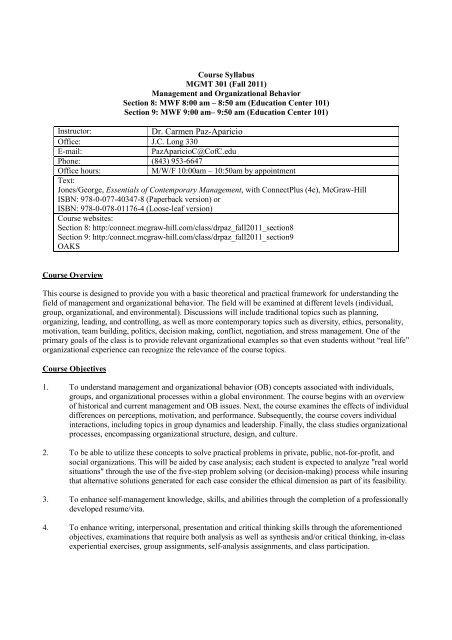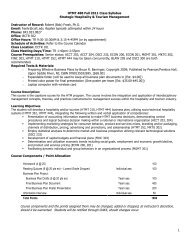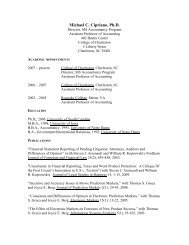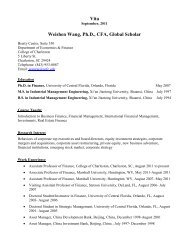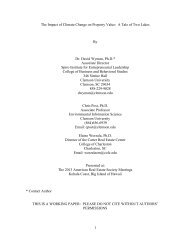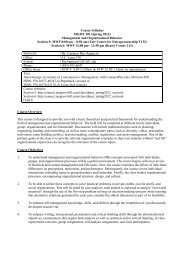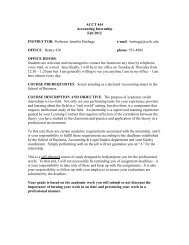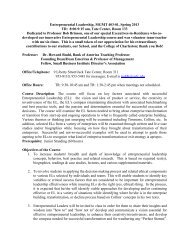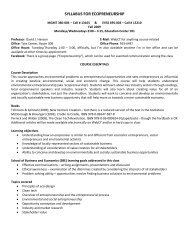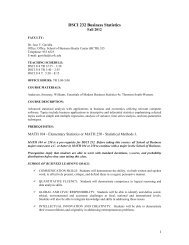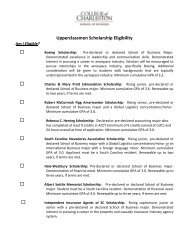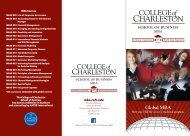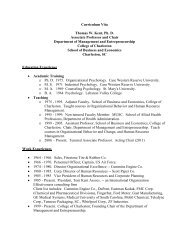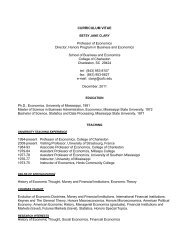Dr. Carmen Paz-Aparicio - School of Business - College of Charleston
Dr. Carmen Paz-Aparicio - School of Business - College of Charleston
Dr. Carmen Paz-Aparicio - School of Business - College of Charleston
You also want an ePaper? Increase the reach of your titles
YUMPU automatically turns print PDFs into web optimized ePapers that Google loves.
Course Syllabus<br />
MGMT 301 (Fall 2011)<br />
Management and Organizational Behavior<br />
Section 8: MWF 8:00 am – 8:50 am (Education Center 101)<br />
Section 9: MWF 9:00 am– 9:50 am (Education Center 101)<br />
Instructor: <strong>Dr</strong>. <strong>Carmen</strong> <strong>Paz</strong>-<strong>Aparicio</strong><br />
Office: J.C. Long 330<br />
E-mail: <strong>Paz</strong><strong>Aparicio</strong>C@C<strong>of</strong>C.edu<br />
Phone: (843) 953-6647<br />
Office hours: M/W/F 10:00am – 10:50am by appointment<br />
Text:<br />
Jones/George, Essentials <strong>of</strong> Contemporary Management, with ConnectPlus (4e), McGraw-Hill<br />
ISBN: 978-0-077-40347-8 (Paperback version) or<br />
ISBN: 978-0-078-01176-4 (Loose-leaf version)<br />
Course websites:<br />
Section 8: http:/connect.mcgraw-hill.com/class/drpaz_fall2011_section8<br />
Section 9: http:/connect.mcgraw-hill.com/class/drpaz_fall2011_section9<br />
OAKS<br />
Course Overview<br />
This course is designed to provide you with a basic theoretical and practical framework for understanding the<br />
field <strong>of</strong> management and organizational behavior. The field will be examined at different levels (individual,<br />
group, organizational, and environmental). Discussions will include traditional topics such as planning,<br />
organizing, leading, and controlling, as well as more contemporary topics such as diversity, ethics, personality,<br />
motivation, team building, politics, decision making, conflict, negotiation, and stress management. One <strong>of</strong> the<br />
primary goals <strong>of</strong> the class is to provide relevant organizational examples so that even students without “real life”<br />
organizational experience can recognize the relevance <strong>of</strong> the course topics.<br />
Course Objectives<br />
1. To understand management and organizational behavior (OB) concepts associated with individuals,<br />
groups, and organizational processes within a global environment. The course begins with an overview<br />
<strong>of</strong> historical and current management and OB issues. Next, the course examines the effects <strong>of</strong> individual<br />
differences on perceptions, motivation, and performance. Subsequently, the course covers individual<br />
interactions, including topics in group dynamics and leadership. Finally, the class studies organizational<br />
processes, encompassing organizational structure, design, and culture.<br />
2. To be able to utilize these concepts to solve practical problems in private, public, not-for-pr<strong>of</strong>it, and<br />
social organizations. This will be aided by case analysis; each student is expected to analyze "real world<br />
situations" through the use <strong>of</strong> the five-step problem solving (or decision-making) process while insuring<br />
that alternative solutions generated for each case consider the ethical dimension as part <strong>of</strong> its feasibility.<br />
3. To enhance self-management knowledge, skills, and abilities through the completion <strong>of</strong> a pr<strong>of</strong>essionally<br />
developed resume/vita.<br />
4. To enhance writing, interpersonal, presentation and critical thinking skills through the aforementioned<br />
objectives, examinations that require both analysis as well as synthesis and/or critical thinking, in-class<br />
experiential exercises, group assignments, self-analysis assignments, and class participation.
<strong>School</strong> <strong>of</strong> <strong>Business</strong> Objectives<br />
The content <strong>of</strong> this course meets each <strong>of</strong> the goals <strong>of</strong> the SOB:<br />
• Problem Solving: Students will be expected to resolve issues presented in case analyses. Students will<br />
also be expected to work with group members to identify major issues in business and organizational<br />
behavior (e.g., from Harvard <strong>Business</strong> Review, the business section <strong>of</strong> The New York Times, <strong>Business</strong><br />
Week, etc).<br />
• Global Awareness: Topics covered in the course include different values encountered across cultures,<br />
differences in communication across cultures, and awareness <strong>of</strong> ethical business issues across cultures.<br />
In addition, students will discuss current trends in management and organizational behavior, including a<br />
shift to more internationally focused businesses.<br />
• Ethical Awareness: Models <strong>of</strong> ethical decision-making will be taught. In addition, ethical issues will be<br />
discussed in multiple case analyses.<br />
• Communication: Students will be expected to answer essay style questions, discuss case analysis, and<br />
submit a group paper. Students will also be expected to consistently participate in class and small group<br />
discussions, and will be required to make a group presentation during the semester.<br />
Course Policies<br />
Preparation, participation, and attendance. You are expected to arrive on-time for each class, and to stay for<br />
the entire duration <strong>of</strong> the class period. Attendance will be taken at the beginning <strong>of</strong> most class periods. It is in<br />
your best interest to be in class each and every day, as material from the text and our discussions is included on<br />
the tests. If you come in late, you may not be allowed to enter the class after the class has started, especially if<br />
the tardiness is habitual. Be aware that when you are tardy you disrupt the learning <strong>of</strong> the entire class – this is<br />
unacceptable.<br />
Faculty have been asked to instruct students to register their absence excuses with the Associate Dean’s Office.<br />
When students submit excuses to the Associate Dean’s <strong>of</strong>fice, an email is sent to each <strong>of</strong> the students’<br />
pr<strong>of</strong>essors. The email denotes the absence as either documented or undocumented. Documented excuses will be<br />
counted as excused in this course; undocumented absences will be counted as unexcused. Here are the<br />
instructions for filing an excuse.<br />
********************<br />
Good Morning from the Absence Memo Office! Here are a few important steps if you have students that miss class during<br />
the semester that will be helpful for our students and hopefully for you also.<br />
Please ask your students that miss or will need to miss class to do the following:<br />
• Come to 67 George Street (white house next to Stern Center) to discuss absences and fill out the appropriate<br />
forms.<br />
• Memos come from our <strong>of</strong>fice only, please do not send them anywhere else.<br />
• Any questions should come directly to either Constance Nelson or Evelyn Nadel.<br />
• We do have the forms online at: http://www.c<strong>of</strong>c.edu/studentaffairs/general_info/absence and they also can be<br />
faxed to our <strong>of</strong>fice at 953-2290.<br />
• They will need documentation for health, personal or emergency situations.<br />
• Athletic Teams and school sponsored trips will have documented lists <strong>of</strong> students participating on our<br />
letterhead as early in the semester as we get the information from the organization. We would like all<br />
information on all scheduled outings to reach us at least two full weeks in advance. We will then turn the<br />
information back to the coach or advisor. The students themselves are responsible for getting this to their<br />
individual faculty members.<br />
We appreciate your assistance so that our students will not have to walk all over campus to find us.<br />
****************<br />
2
You are expected to prepare for each class session in advance by reading the assigned material. The material<br />
will be reviewed during class, however, the primary purpose <strong>of</strong> class sessions is to <strong>of</strong>fer you the opportunity to<br />
discuss issues and make thoughtful inquiries regarding the material. You are expected to be familiar with the<br />
material and are encouraged to make comments and raise questions. In fact, you may be called on to answer a<br />
question or contribute an opinion during class. You may also be called upon to present a set <strong>of</strong> slides. Students<br />
may also attend <strong>of</strong>fice hours or submit e-mails with questions about the course material. Please note that<br />
preparation and participation do contribute “formally” to your overall grade.<br />
Late Assignments. All assignments are due at the beginning <strong>of</strong> class. No points will be assigned if the<br />
assignment is turned in late. Printer issues, absences without excuses that indicate that the absence was<br />
unforeseeable, etc. are not considered excuses for late assignments!<br />
Honor Code and Code <strong>of</strong> Conduct Policy: All students are expected to conduct themselves in a pr<strong>of</strong>essional and<br />
courteous manner including coming to class on time and leaving early only with the prior approval <strong>of</strong> the<br />
pr<strong>of</strong>essor. All students are also expected to dress appropriately for class. Specifically, students may be asked to<br />
remove visors or hats, and distracting attire will not be allowed. Food and drink are also not permitted in the<br />
classroom. Furthermore, inappropriate or disrespectful behavior will not be tolerated (whether directed towards<br />
other students or the pr<strong>of</strong>essor), and may be deemed a violation <strong>of</strong> the honor code. All students are expected to<br />
adhere to the <strong>College</strong> Honor Code. Specifically:<br />
Lying, cheating, attempted cheating, and plagiarism are violations <strong>of</strong> our Honor Code that, when identified, are<br />
investigated. Each incident will be examined to determine the degree <strong>of</strong> deception involved. Incidents where the<br />
instructor determines the student’s actions are clearly related more to a misunderstanding will be handled by the<br />
student’s instructor. A written explanation designed to help prevent the student from repeating the error in the<br />
future will be given to the student by his/her instructor. The explanation, submitted by form and signed by both<br />
the instructor and the student will be forwarded to the Dean <strong>of</strong> Students and placed in the student’s file.<br />
Cases <strong>of</strong> suspected academic dishonesty will be reported directly by the instructor and/or others having<br />
knowledge <strong>of</strong> the incident to the Dean <strong>of</strong> Students. A student found responsible by the Honor Board for<br />
academic dishonesty will receive a XF in the course, indicating failure <strong>of</strong> the course due to academic dishonesty.<br />
This grade will appear on the student’s transcript for two years after which time the student may petition for the<br />
X to be expunged. The student may also be placed on disciplinary probation, suspended (temporary removal) or<br />
expelled (permanent removal) from the <strong>College</strong> by the Honor Board.<br />
Students should be aware that unauthorized collaboration – working together without permission – is a form <strong>of</strong><br />
cheating. Unless an instructor specifies that students can work together on an assignment and/or test, no<br />
collaboration is permitted. Other forms <strong>of</strong> cheating include possessing or using an unauthorized study aid (such<br />
as a PDA), copying from others’ exams, fabricating data, and giving unauthorized assistance. Research<br />
conducted and/or papers written for other classes cannot be used in whole or in part for any assignment in this<br />
class without obtaining prior permission from the pr<strong>of</strong>essor.<br />
Students can find the complete Honor Code and all related processes in the Student Handbook at<br />
http://studentaffairs.c<strong>of</strong>c.edu/honor-system/studenthandbook/index.php<br />
3
Course Requirements<br />
Your final course grade will be tentatively calculated as follows (changes to this point system will be announced<br />
in class). Letter grades will be assigned according to the following scale, in conjunction with the current <strong>College</strong><br />
<strong>of</strong> <strong>Charleston</strong> standard:<br />
2 Exams (20 points each) 40<br />
Group Paper/Presentation on Events 20<br />
Quizzes 10<br />
In-class & online activities 20<br />
Participation & Involvement 10<br />
Total 100<br />
*** All written assignments, other than exams, must be<br />
completed on a word-processor. Hand-written assignments will<br />
not be accepted.<br />
Percent Grade<br />
94 – 100 % A<br />
90 – 93 % A-<br />
87 – 89 % B+<br />
84 – 86 % B<br />
80 – 83 % B-<br />
77 – 79 % C+<br />
74 – 76 % C<br />
70 – 73 % C-<br />
67 – 69 % D+<br />
64 – 66 % D<br />
60 – 63 % D-<br />
< than 60 % F<br />
Exams. Two (2) in-class exams will be given, worth 20 points each. Questions may include multiple choice,<br />
true/false, fill-in-the-blank, short answer, and essay questions. Exam questions will be drawn from material from<br />
the text, other assigned readings, and the material covered in class.<br />
Group Presentation and Paper on a Current Event. This term, you will form into a group <strong>of</strong> four-five, and you<br />
will be expected to make a ten-minute presentation. The presentation will focus on one topic covered in the<br />
course – you will choose a series <strong>of</strong> current events from the semester that correspond with the topic. Your group<br />
will also submit a 10-page paper that corresponds with your presentation topic. The paper and presentation<br />
should: 1) summarize several (at least 5) current events that correspond with your topic, 2) describe how the<br />
current events integrate with the material covered in the class, 3) include at least one article that is international<br />
in focus, and 4) look for themes across the articles. Thus, you may need to strategically choose articles that form<br />
a theme. Additional information regarding this assignment will be provided later in the semester.<br />
Quizzes. They will be available in OAKS and there is one per chapter. Deadlines are specified in the course<br />
schedule and in OAKS.<br />
In-class and online activities. There will be assorted assignments and other activities scheduled online and in<br />
class throughout the course <strong>of</strong> the semester. These will be used to explain the content <strong>of</strong> the course, to<br />
emphasize important concepts and expand beyond the textbook. Online assignments will be submitted and<br />
graded online and will sometimes serve as a basis for class discussion. Please see the course site for assignment<br />
deadlines.<br />
4
Participation and Involvement. Your attendance to class and your participation in discussions is crucial. It is up<br />
to you to create opportunities to derive value from the class while making informed contributions to class<br />
learning. There are different ways <strong>of</strong> doing this: responding to questions, supplementing or challenging others’<br />
comments, raising the level <strong>of</strong> discourse through probing, and asking the right question that illuminates the<br />
concept/issues under investigation.<br />
The discussion rubric described below will serve you as a guidance on how grading will be assigned.<br />
Attendance will also be taken into account.<br />
GRADING<br />
CRITERIA<br />
QUALITY OF<br />
INFORMATION<br />
RESOURCES<br />
CRITICAL<br />
THINKING<br />
PARTICIPATION<br />
PROFESSIONAL<br />
LANGUAGE<br />
A<br />
(10 points)<br />
Information clearly<br />
relates to the main<br />
topic and adds new<br />
concepts,<br />
information. It<br />
includes several<br />
supporting details<br />
and/or examples.<br />
Consistently<br />
provides resources<br />
even if not required.<br />
Enhances the<br />
critical thinking<br />
process consistently<br />
through premise<br />
reflection and<br />
difference<br />
questioning <strong>of</strong> self<br />
and others.<br />
Encourages and<br />
facilitates<br />
interaction among<br />
the students.<br />
Both pr<strong>of</strong>essional<br />
vocabulary and<br />
writing style are<br />
used consistently<br />
throughout the<br />
discussion.<br />
B<br />
(7.5 points)<br />
Information clearly<br />
relates to the main<br />
topic. It provides at<br />
least one supporting<br />
detail or example.<br />
Occasionally<br />
provides resources<br />
even if not required.<br />
Critical thinking<br />
and premise<br />
reflection is<br />
demonstrated in<br />
discussion by the<br />
individual only.<br />
Responds to other<br />
students in the class.<br />
Both pr<strong>of</strong>essional<br />
vocabulary and<br />
writing style are<br />
used frequently<br />
throughout the<br />
discussion.<br />
C<br />
(5 points)<br />
Information clearly<br />
relates to the main<br />
topic. No details<br />
and/or examples are<br />
given.<br />
Provides resources<br />
when requested.<br />
Responds to<br />
questions but does<br />
not engage in<br />
premise reflection.<br />
Rarely interacts or<br />
responds to other<br />
students in the class.<br />
Both pr<strong>of</strong>essional<br />
vocabulary and<br />
writing style are<br />
used occasionally<br />
throughout the<br />
discussion.<br />
D<br />
(0 points)<br />
Information has<br />
little or nothing to<br />
do with the main<br />
topic or simply<br />
restates the main<br />
concept.<br />
Does not provide<br />
resources even<br />
when requested.<br />
5<br />
Does not respond to<br />
questions posed by<br />
the facilitator.<br />
Responds to the<br />
pr<strong>of</strong>essor only.<br />
Pr<strong>of</strong>essional<br />
vocabulary and<br />
writing style are not<br />
used.
Tentative Course Schedule<br />
The schedule below is subject to change; changes will be announced during class. Unless otherwise instructed,<br />
students should be prepared to discuss the material listed below on the scheduled date. Additional readings may<br />
be assigned, and will be distributed in class.<br />
Session Class Subject Notes/comments<br />
W August 24 th Syllabus, Class Introduction<br />
F August 26 th<br />
PART I: MANAGEMENT AND<br />
MANAGERS<br />
Ch 1: The Management Process Today<br />
M August 29 th Ch 1: The Management Process Today<br />
W August 31 st<br />
F Sept 2 nd<br />
Ch 2: Values, Attitudes, Emotions, and Culture:<br />
The Manager as a Person<br />
Ch 2: Values, Attitudes, Emotions, and Culture:<br />
The Manager as a Person<br />
M Sept 5 th Discuss Group Assignment<br />
W Sept 7 th<br />
PART II: THE ENVIRONMENT OF<br />
MANAGEMENT<br />
Ch 3: Managing Ethics and Diversity<br />
F Sept 9 th Ch 4: Managing in the Global Environment<br />
M Sept 12 th Ch 4: Managing in the Global Environment<br />
W Sept 14 th Integration <strong>of</strong> PART I and PART II topics<br />
F Sept 16 th<br />
M Sept 19 th<br />
W Sept 21 st<br />
PART III: PLANNING, DECISION<br />
MAKING, AND COMPETITIVE<br />
ADVANTAGE<br />
Ch 5: Decision Making, Learning, Creativity,<br />
and Entrepreneurship<br />
Ch 6: Planning, Strategy, and Competitive<br />
Advantage<br />
Ch 6: Planning, Strategy, and Competitive<br />
Advantage<br />
F Sept 23 rd Integration <strong>of</strong> PART III topics<br />
M Sept 26 th<br />
PART IV: ORGANIZING AND CHANGE<br />
Ch 7: Designing Organizational Structure<br />
W Sept 28 th Ch 7: Designing Organizational Structure<br />
F Sept 30 th Ch 8: Control, Change, and Entrepreneurship<br />
M Oct 3 rd Ch 8: Control, Change, and Entrepreneurship<br />
W Oct 5 th Cover Letters & Résumés Discussion<br />
F Oct 7 th Integration <strong>of</strong> PART IV topics<br />
M Oct 10 th Exam 1: Chapter 1 – Chapter 8<br />
W Oct 12 th<br />
F Oct 14 th Ch 9: Motivation<br />
M Oct 17 th FALL BREAK<br />
PART V: LEADING INDIVIDUALS AND<br />
GROUPS<br />
Ch 9: Motivation<br />
Online activities & quizzes due for<br />
Ch.1-Ch.4<br />
Online activities & quizzes due for<br />
Ch.5-Ch.8<br />
6
W Oct 19 th Ch 10: Leaders and Leadership<br />
F Oct 21 st Ch 10: Leaders and Leadership<br />
M Oct 24 th Review <strong>of</strong> projects<br />
W Oct 26 th Ch 11: Effective Team Management<br />
F Oct 28 th Ch 11: Effective Team Management<br />
M Oct 31 st<br />
W Nov 2 nd<br />
Ch 12: Building and Managing Human<br />
Resources<br />
Ch 12: Building and Managing Human<br />
Resources<br />
F Nov 4 th Integration <strong>of</strong> PART V topics<br />
M Nov 7 th<br />
W Nov 9 th<br />
F Nov 11 th<br />
M Nov 14 th<br />
PART VI: CONTROLLING ESSENTIAL<br />
ACTIVITIES AND PROCESSES<br />
Ch 13: Communication and Information<br />
Technology Management<br />
Ch 13: Communication and Information<br />
Technology Management<br />
Ch 14: Operations Management: Managing Vital<br />
Operations and Processes<br />
W Nov 16 th Review <strong>of</strong> Projects<br />
Ch 14: Operations Management: Managing Vital<br />
Operations and Processes<br />
F Nov 18 th Integration <strong>of</strong> PART VI topics<br />
M Nov 21 st Review <strong>of</strong> presentations and guidelines<br />
W Nov 23 rd THANKSGIVING HOLIDAY<br />
F Nov 25 th THANKSGIVING HOLIDAY<br />
M Nov 28 th Exam 2: Chapter 9 – Chapter 14<br />
Online activities & quizzes due for<br />
Ch.9-Ch.12<br />
Online activities & quizzes due for<br />
Ch.13-Ch.14<br />
W Nov 30 th Presentations Group Papers Due<br />
F Dec 2 nd Presentations<br />
M Dec 5 th Presentations<br />
7


